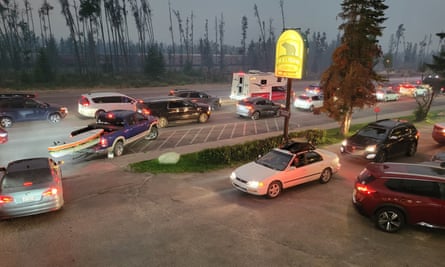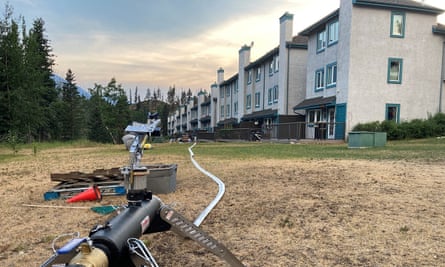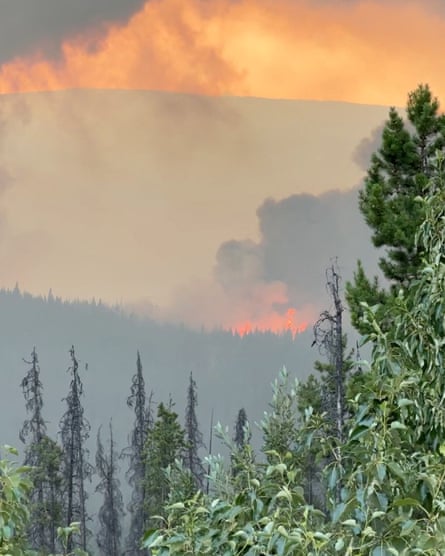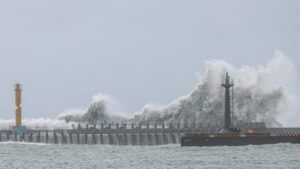A fast-moving wildfire has destroyed parts of Jasper, the historic mountain town in the Canadian Rockies, with officials still waiting to learn the extent of damage after an “exceptionally difficult day” of firefighting. The blaze had forced more than 25,000 thousand people to flee earlier this week.
Jasper national park officials said the fire entered the southern edge of the town on Wednesday evening. But, given the speed and intensity of the blaze, fire crews working to protect key infrastructure were ordered to retreat.
Justin Trudeau, Canada’s prime minister, said on Thursday that his government had approved Alberta province’s request for federal assistance, adding that it was deploying military resources and evacuation support, as well as coordinating firefighting and airlift assistance.
“Alberta, we’re with you,” Trudeau posted on X.
A Parks Canada spokesperson, James Eastham, said the “intense” fire behaviour quickly overwhelmed teams on the ground. “Fire crews were witnessing 300 to 400ft flames in a fully involved, continuous crown fire and a fire spread rate of approximately 15 metres per minute,” he said.
Helicopters flying overhead with buckets did little to dampen the ferocity of the fire and water bomber airplanes could not approach the area because of poor flying conditions, Parks Canada said on social media. A final, frantic effort to use controlled burns to direct the fire away from the community was unsuccessful.
First responders were ordered to relocate to Hinton, a town 50 miles (80km) north-east. Structural firefighters remained in the town. The withdrawal of crews meant fire guards were not able to be completed.

Eastham later told reporters outside Jasper that the town was filled with smoke and there “has been structural loss”.
“At this point, I can’t confirm how many, locations or specific structures. The fire continues to burn,” he said.
Images of the Maligne Lodge hotel and the WickedCup cafe, both fully consumed by flames, spread on social media.
On X, the account for Fairmont Jasper Park Lodge said the flames had reached the hotel’s grounds, but the extent of damage, if any, is not yet known.

Parks Canada said firefighters were working to save “as many structures as possible and to protect critical infrastructure, including the wastewater treatment plant, communications facilities, the Trans Mountain pipeline and others”.
Jasper is being hit by fires from the north and south, and the town’s 5,000 residents – along with 20,000 more park visitors – fled at short notice late Monday night when the fires first flared.
The Alberta premier, Danielle Smith, said she was “heartbroken”.
“We’re going to do whatever we can to put this fire out,” she said in a video posted to social media.
A record number of wildfires in 2023 forced more than 235,000 people across Canada to evacuate and sent thick smoke into parts of the US, leading to hazy skies and health warnings in multiple cities.
after newsletter promotion
The northern fire was spotted about 3 miles (5km) from Jasper earlier on Wednesday. The southern fire had been reported about 5 miles (8km) away from the town, but Katie Ellsworth, of Parks Canada, said strong gusts swooping in sent it racing and fire perimeters changed minute by minute.

Ellsworth said the decision to relocate all first responders to Hinton, just outside the eastern edge of the park, “has not been made lightly”.
She said: “Given the intensity of fire behaviour being observed, the decision has been made to limit the number of responders exposed to this risk.”
The United Nations designated the parks that comprise the Canadian Rockies, including Jasper, a world heritage site in 1984 because of the striking mountain landscape. Last year, the park received a record 2.48 million visitors.

Local people and visitors streamed out by the thousands late on Monday and Tuesday, and officials said on Wednesday the evacuation of the town of Jasper was complete.
Alberta has been baking under scorching temperatures that have already forced another 7,500 people out of remote communities. About 177 wildfires were burning across the province.
Leanne Maeva Joyeuse, who lives in Jasper, was relieved but exhausted after reaching the Grand Prairie evacuation centre following 20 hours on the road with her grandmother, parents and younger brother.
“We’re just waiting to go back home and see how many days we’re going to be stuck here,” Joyeuse said.
Some respite is expected, with heavy rain forecast in Jasper, possibly taming the blaze and giving fire crews a chance to regroup and to survey the toll of the wildfire.
Source: theguardian.com


















